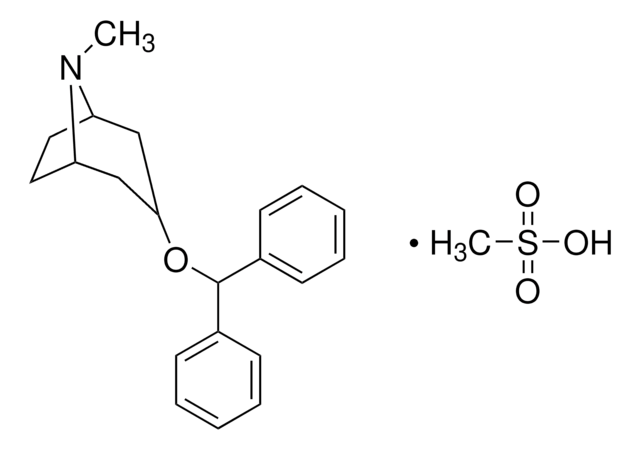SML0847
Benztropine mesylate
≥98% (HPLC)
Synonyme(s) :
Benzatropine mesylate, Benzotropine mesylate, Benztropine methanesulfonate
About This Item
Produits recommandés
Niveau de qualité
Pureté
≥98% (HPLC)
Forme
powder
Conditions de stockage
desiccated
Couleur
white to beige
Solubilité
H2O: 20 mg/mL, clear
Température de stockage
2-8°C
Chaîne SMILES
CS(O)(=O)=O.CN1[C@H]2CC[C@@H]1C[C@@H](C2)OC(c3ccccc3)c4ccccc4
InChI
1S/C21H25NO.CH4O3S/c1-22-18-12-13-19(22)15-20(14-18)23-21(16-8-4-2-5-9-16)17-10-6-3-7-11-17;1-5(2,3)4/h2-11,18-21H,12-15H2,1H3;1H3,(H,2,3,4)/t18-,19+,20+;
Clé InChI
CPFJLLXFNPCTDW-BWSPSPBFSA-N
Informations sur le gène
human ... CHRM1(1128)
Vous recherchez des produits similaires ? Visite Guide de comparaison des produits
Description générale
Application
Actions biochimiques/physiologiques
Caractéristiques et avantages
Mention d'avertissement
Danger
Mentions de danger
Conseils de prudence
Classification des risques
Acute Tox. 3 Dermal - Acute Tox. 3 Inhalation - Acute Tox. 4 Oral
Code de la classe de stockage
6.1C - Combustible acute toxic Cat.3 / toxic compounds or compounds which causing chronic effects
Classe de danger pour l'eau (WGK)
WGK 3
Point d'éclair (°F)
Not applicable
Point d'éclair (°C)
Not applicable
Certificats d'analyse (COA)
Recherchez un Certificats d'analyse (COA) en saisissant le numéro de lot du produit. Les numéros de lot figurent sur l'étiquette du produit après les mots "Lot" ou "Batch".
Déjà en possession de ce produit ?
Retrouvez la documentation relative aux produits que vous avez récemment achetés dans la Bibliothèque de documents.
Articles
Muscarinic acetylcholine receptors mediate acetylcholine actions in CNS and non-nervous tissues, crucial for cell signaling.
Muscarinic acetylcholine receptors mediate acetylcholine actions in CNS and non-nervous tissues, crucial for cell signaling.
Muscarinic acetylcholine receptors mediate acetylcholine actions in CNS and non-nervous tissues, crucial for cell signaling.
Muscarinic acetylcholine receptors mediate acetylcholine actions in CNS and non-nervous tissues, crucial for cell signaling.
Notre équipe de scientifiques dispose d'une expérience dans tous les secteurs de la recherche, notamment en sciences de la vie, science des matériaux, synthèse chimique, chromatographie, analyse et dans de nombreux autres domaines..
Contacter notre Service technique







